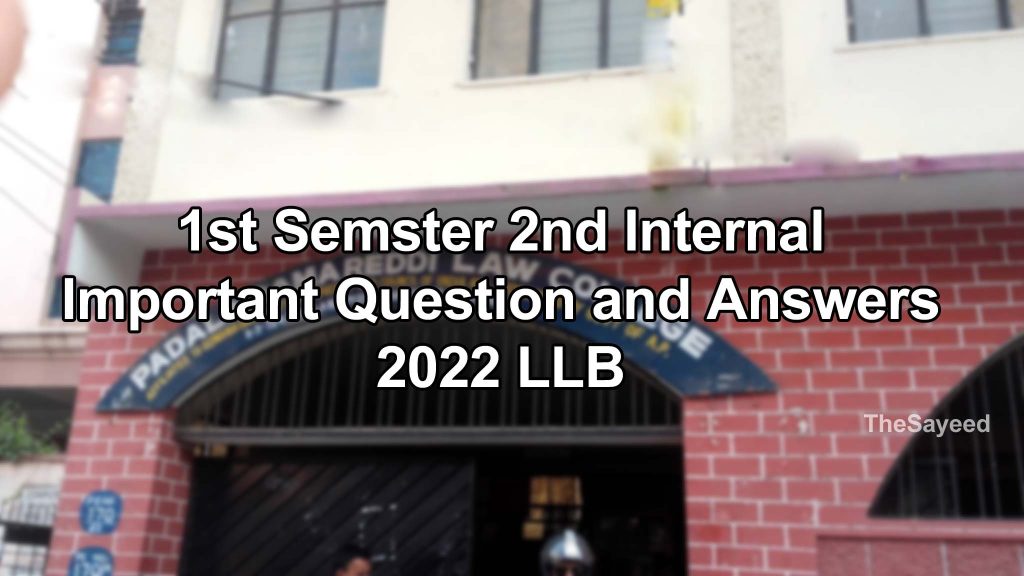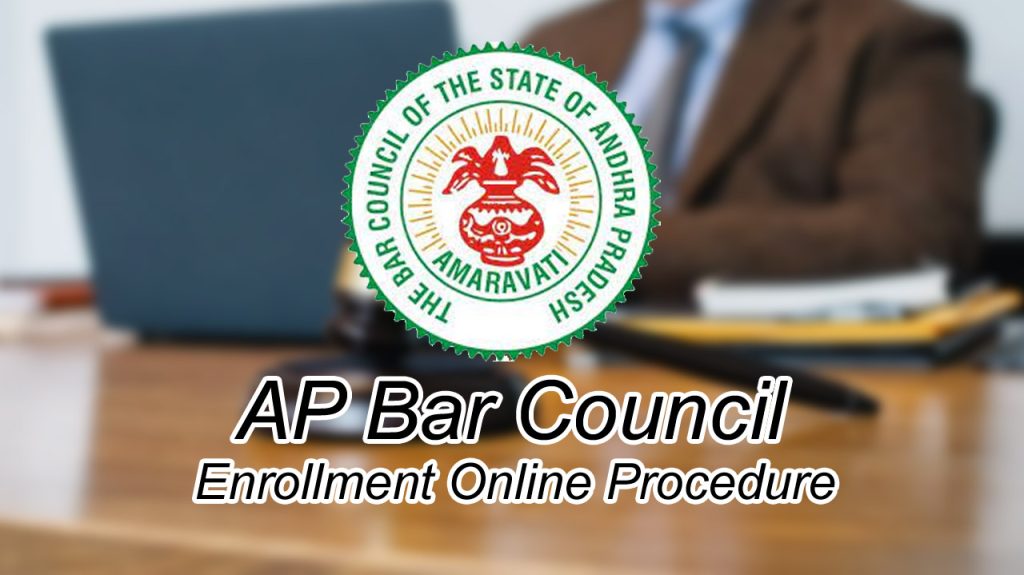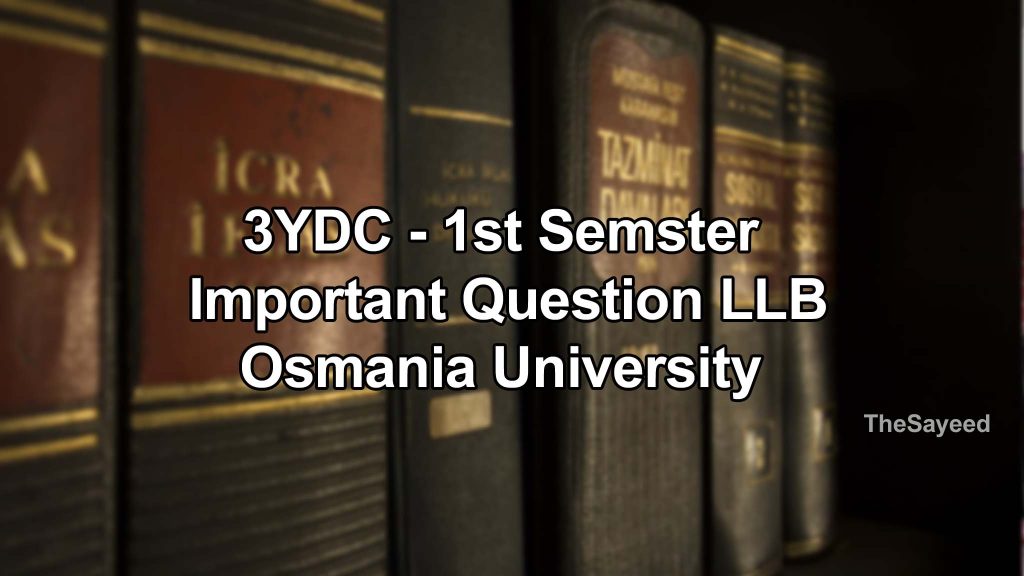2nd Sem 2nd Internal Questions and Answers PRR
2nd Sem 2nd Internal
Contracts
- A contract of sale is a binding agreement between a seller and a buyer, where the seller agrees to transfer goods or property to the buyer in exchange for a specified price
- In a sale of goods, the property of the goods is transferred to the buyer at the time of the contract.
- In a hire purchase agreement, the hirer has the option to buy.
- following is a document of title to goods – Bill of Lading, Warehouse Receipt, Delivery Order, Negotiable Instruments (ALL)
- Definition of a condition – Stipulation – Specific requirement that must be fulfilled for the contract to be binding.
- Contribution among partners – proportional sharing of profits, losses, and liabilities among partners based on their agreed contributions to a partnership
- Relationship arises from partnership contract Relations among the partners themselves. 2. Relations of the partners with the partnership. 3. Relations of the partnership with third persons with whom it contracts. 4. Relations of the partners with such third persons.
- Registration of partnership is optional.
- in a partnership unlimited liability
- Essential elements of contract of sale 2 parties, buyer
*****************
- ‘Nemo dat quod non habet’ means ‘no one gives what he doesn’t have’.
- “Caveat emptor” means “let the buyer beware”
- auction sale – public sale of property to the highest bidder
- breach of condition – repudiate contract, Warranty – claim damage.
- CIF contract – Cost, Insurance, and Freight.
- Law of partnership is an extension of law of agency
- Minor in partnership cannot be full fledged in partnership
- in partnership at will notice should be given
- mutual liabilities of a (LLP) are governed by the LLP agreement
- Complete breakdown of partnership – dissolution of the firm
******************
- Differences between Sale and Agreement to Sell
| Sale | Agreement to Sell | |
| Nature | Transfer of ownership | Transfer of future ownership |
| Execution | Immediate transfer of goods | Future transfer of goods upon specified event |
| Transfer of Risk | Transfers immediately to the buyer | Remains with the seller until transfer |
| Insolvency | Buyer has the risk of seller’s insolvency | Seller retains ownership in case of insolvency |
| Breach | Considered a breach of contract if not fulfilled | Considered a breach of contract if not fulfilled |
| Remedies | Buyer’s remedy is damages and specific performance | Seller’s remedy is damages |
- Implied Conditions and Warranties Certain terms that are automatically incorporated into contracts, either by law or by customary practice, without the need for explicit agreement. They provide protection to buyers by ensuring that goods or services meet certain standards of quality, fitness for purpose, and conformity with description. Breach of these implied conditions and warranties can give rise to legal remedies for the affected party, such as the right to reject goods, claim damages, or seek specific performance.
- Rights of Unpaid Seller: legal protections and remedies available to a seller when the buyer fails to make payment for the goods or breaches the terms of the contract.
Right of Lien
Right of Stoppage in Transit
Right of Resale
Right to Sue for Price
Right to Claim Damages
Right to Withhold Delivery
- Essentials of Partnership:
Agreement
Mutual Agency
Sharing of Profits and Losses
Common Ownership and Contribution
Legal Capacity
Business Purpose
- Modes of Dissolution of Partnership:
Dissolution by Agreement
Dissolution by Notice
Dissolution by Expiry of Term
Dissolution by Death or Insolvency
Dissolution by Court Order
Dissolution by Illegality or Impossibility
—————————————————————
Family Law 2nd Sem 2nd Internal
- Talaq-ul-Sunnah is a form of divorce is approved
- Talaq-e-Tawiz,” which refers to delegated divorce
- Kul means Put off
- Divorce by mutual consent, also known as “Khula” or “Mubarat” Both
- Lian means false charges of Adultery
- “Apostasy” – renouncing or abandoning a religious faith or belief system
- Conversion both
- Ijazat / Izazat – custody
- prenuptial agreements are valid
- gifts under muslim law are revocable
——————————-
- Wakf under Muslim law is pious
- Under Wakf, the property is vested in the name of God
- Waqf-ul-Aulad is also called Family Waqf
- Major amendments to the Divorce Act were brought in the years 1999, 2002
- Inter-religious marriages are allowed under the Special Marriage Act.
- Christians have the Christian Marriage Act, 1872
- prohibition of child Secular Act
- waqf tribunal year 1995
- Indian succession Act 1925
- Shah Bano Begum 1985
1.Divorce
Diivorce is governed by the Muslim Personal Law (Shariat) Application Act, 1937
- Divorce Types: The main types of divorce are Talaq and Khula.
- Talaq: It is the husband’s right to pronounce divorce unilaterally, which can be revocable or irrevocable.
- Khula: It is a divorce initiated by the wife, where she seeks dissolution of the marriage by offering a consideration to the husband.
- ‘Iddat’ Period: After divorce, a waiting period known as ‘iddat’ is observed before the divorce becomes final.
- Arbitration: Mediation and arbitration are encouraged for reconciliation before divorce.
- Registration: In India, divorces are required to be registered with the appropriate authorities for legal recognition.
2. Acknowledgement of Paternity (AOP): A legal procedure allowing a father to voluntarily and officially establish his legal relationship with his biological child, affirming his rights and responsibilities as the child’s father, including financial support, inheritance, and parental rights. It provides a means for fathers to actively participate in the upbringing and welfare of their children while promoting stability and legal protection for both the child and the father.
3. Maintenance to Wife: In Muslim law, maintenance to the wife is an obligation imposed on the husband to provide financial support to his wife during the subsistence of marriage and even after divorce. It includes the provision of basic necessities such as food, clothing, shelter, and other reasonable expenses required for the wife’s well-being. The purpose of maintenance is to ensure the wife’s financial security and to uphold her rights and dignity within the marital relationship. The amount of maintenance is determined based on various factors, including the husband’s financial capacity and the standard of living enjoyed during the marriage.
4. Hiba (Gift): In Muslim law, Hiba refers to the act of voluntary transfer of property from one person (donor) to another (donee) without any consideration or expectation of return. It is a form of gift-giving where the donor transfers ownership of the property to the donee out of love, affection, or goodwill. The essential elements of Hiba include the intention of the donor to gift the property, the acceptance of the gift by the donee, and the delivery of the gifted property. Hiba can be made during the donor’s lifetime or even as part of a will. Once a valid Hiba is made, the gifted property becomes the absolute property of the donee, and the donor loses all rights over it.
5.Mutawalli : Person who is appointed as the manager or administrator of a Waqf property. A Waqf is a charitable endowment or trust created by a Muslim for religious, educational, or social purposes. The Mutawalli is responsible for the proper management and utilization of the Waqf property in accordance with the terms and conditions set by the donor. The duties of a Mutawalli may include collecting and managing the income generated by the Waqf property, maintaining the property, disbursing funds for the intended purposes, and ensuring the fulfillment of the donor’s wishes. The appointment of a Mutawalli can be made by the Waqif (person creating the Waqf) during their lifetime or through a provision in their will. The Mutawalli plays a crucial role in preserving and safeguarding the assets of the Waqf for the benefit of the designated beneficiaries or the intended charitable objectives.
———————————————————————————–
2nd Sem 2nd Internal Constitution
- Tortious Liability of state under Article: Article 300
- Contractual Liability of state under article: Article 298 and 299.
- Doctrine of pleasure for state: Governer
- Doctrine of pleasure for Union: President
- Doctrine of pleasure under article: Article 310 / UK ***
- What’s article 229: Appointment of Officers and servants and the expenses of High Courts.
- What’s article 300: suits and proceedings by or against the Government of India or a state government
- Who appoints UPSC chairman: President
- Who appoints state PSC: Governor
- Financial emergency under article: Article 360
- Constitutional amendment under article: Article 368
- Central Govt contracts executed in the name of: President
- Article 356: President’s Rule, State Emergency
- National emergency article: Article 352
- Grounds on which Indira Gandhi promulgated emergency: Internal disturbance
- National emergency promulgated in the year of: 25th June 1975
- Grounds for imposing national emergency: War, external aggression, armed rebellion
- Judicial Review power is available to: The Supreme & the High Courts of India
- Judicial review powers are formulated in United States of America
- No of high courts: 25
Shorts
- Safeguards under Article 311:
– Notice and Opportunity to Be Heard: The article provides safeguards to government employees by ensuring that they are given a reasonable opportunity to defend themselves before any disciplinary action is taken against them.
– Tenure and Rank Protection: The article provides security of tenure to certain classes of government employees, preventing their arbitrary dismissal or removal from service.
– Inquiry by Disciplinary Authority: The article mandates that a disciplinary inquiry must be conducted by the appropriate authority before any punitive action is taken against a government employee.
- Impact of Emergency on Fundamental Rights:
– Suspension of Fundamental Rights: During a state of emergency (National Emergency under Article 352, State Emergency under Article 356, or Financial Emergency under Article 360), the President or the Governor has the power to suspend certain fundamental rights guaranteed by the Constitution.
– Reasonable Restrictions: Even when fundamental rights are suspended, certain rights such as the right to life and personal liberty (Article 21) cannot be suspended entirely. However, reasonable restrictions may be imposed on these rights during an emergency.
– Limited Judicial Review: The scope of judicial review is limited during an emergency, and the courts are more deferential to the actions taken by the executive in the interest of national security or public order.
- Procedure of Constitution Amendment:
– Proposal: An amendment to the Constitution can be initiated by either house of Parliament (Lok Sabha or Rajya Sabha) or through a recommendation of a State Legislature.
– Special Majority: The amendment bill must be passed by each house of Parliament by a special majority, which requires a majority of the total membership of each house and a majority of not less than two-thirds of the members present and voting.
– Ratification by States: Some amendments may also require ratification by the legislatures of at least half of the states before they can come into effect.
– Assent of the President: After being passed by Parliament, the amendment bill must receive the assent of the President to become part of the Constitution.
- Basic Structure Theory:
– Judicial Doctrine: The Basic Structure Theory, propounded by the Indian judiciary, holds that certain fundamental features or basic structure of the Constitution cannot be altered through constitutional amendments.
– Core Principles: The theory identifies key principles such as the supremacy of the Constitution, democratic principles, rule of law, judicial review, and separation of powers as part of the basic structure.
– Limitation on Amendment Power: The Basic Structure Doctrine acts as a limitation on the amending power of Parliament, ensuring that it does not alter the fundamental character of the Constitution.
- Doctrine of Repugnancy:
– Conflict between Laws: The Doctrine of Repugnancy applies when there is a conflict or inconsistency between laws enacted by the central government (Union laws) and laws enacted by the state governments (State laws) in areas where both have legislative competence.
– Inoperative State Laws: If a state law is repugnant to a union law, the state law becomes inoperative to the extent of the repugnancy.
– Precedence of Union Law: In case of repugnancy, the union law prevails over the state law, even if the state law has received the governor’s assent.
– Constitutional Validity: The Doctrine of Repugnancy is based on Article 254 of the Indian Constitution, which provides guidelines for resolving conflicts between union and state laws.




Responses